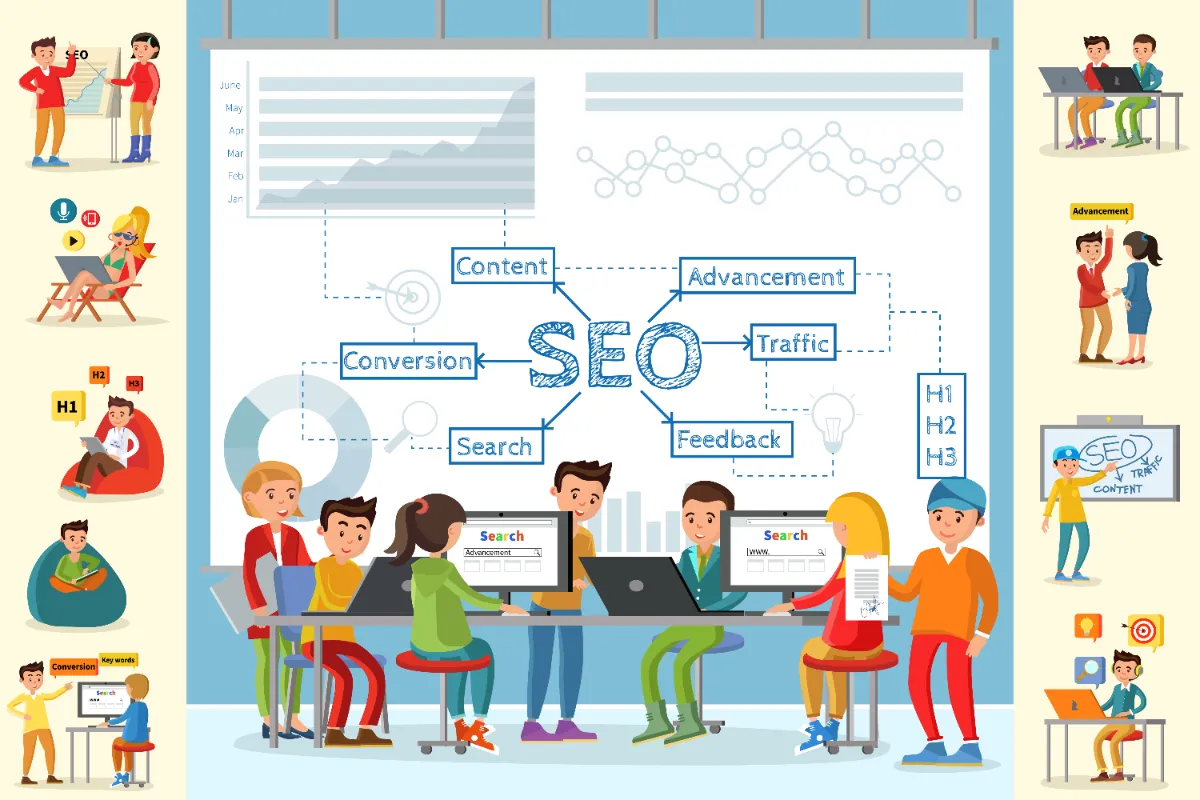In the world of online business, visibility is everything. If your e-commerce store isn’t appearing in search engine results, you’re missing out on countless potential customers. That’s where e-commerce SEO comes in. Optimizing your online store for search engines not only drives organic traffic but also boosts sales and builds long-term brand credibility.
Whether you run a small Shopify store or manage a large online marketplace, understanding search engine optimization Shopify practices is essential. In this guide, we’ll explore the strategies, tools, and techniques that an ecommerce SEO agency would use to maximize your store’s performance
What is E-Commerce SEO?
E-commerce SEO refers to the process of optimizing online stores to rank higher in search engine results pages (SERPs). Unlike traditional SEO, e-commerce SEO focuses on product pages, category pages, and even blog content to attract customers actively looking to purchase.
A strong e-commerce SEO strategy ensures that your products are discoverable, your website is user-friendly, and your content matches the intent of your target audience.
Primary Benefits of E-Commerce SEO:
- Increased Organic Traffic: More visibility means more visitors without paying for ads.
- Higher Conversion Rates: Targeted traffic attracts users who are ready to make a purchase.
- Long-Term Growth: Unlike paid ads, organic rankings provide sustainable results.
- Brand Credibility: Appearing on the first page of Google builds trust.
- Reduced Dependence on Paid Ads: Organic rankings can lower advertising costs over time.

Why E-Commerce SEO is Crucial for Shopify Stores
Shopify is one of the most popular e-commerce platforms, powering thousands of online stores. While Shopify provides a solid foundation, achieving high rankings in search results requires a strategic SEO approach.
Key reasons Shopify stores need SEO:
- Shopify sites often face duplicate content issues with product variations.
- Product descriptions are frequently generic, which can hurt rankings.
- Competitors may already dominate search results with optimized content.
- Shopify stores require proper site architecture and internal linking to enhance user experience and SEO performance.
Integrating search engine optimization Shopify best practices ensures that your store stands out, drives consistent traffic, and converts visitors into buyers.
Key E-Commerce SEO Strategies
Implementing effective e-commerce SEO involves a combination of on-page, off-page, and technical strategies. Let’s dive into the essential elements:
1. Keyword Research
Keyword research in e-commerce SEO means finding the search terms customers use to discover products online. It helps Shopify stores rank higher, attract targeted traffic, and boost sales by focusing on long-tail keywords and aligning content with customer intent.
Keyword research is the backbone of e-commerce SEO. Identify search terms that potential customers use to find products similar to yours.
- Primary Keyword: E-commerce SEO
- Secondary Keywords: Search engine optimization Shopify, e-commerce SEO agency
Tips for Effective Keyword Research:
- Use tools like Ahrefs, SEMrush, or Google Keyword Planner.
- Focus on long-tail keywords for higher conversion.
- Analyze competitors’ websites for opportunities.
- Consider search intent: Informational vs transactional queries.
- Group keywords into product, category, and blog content clusters.
Example: For a Shopify store selling shoes, long-tail keywords like “best running shoes for women 2025” can attract highly targeted traffic.
2. Optimizing Product Pages
Your product pages are the heart of your e-commerce site. Optimizing them properly ensures better search engine rankings and improved user experience.
Key Areas to Optimize:
- Title Tags & Meta Descriptions: Include your primary and secondary keywords naturally.
- Product Descriptions: Write unique, informative descriptions highlighting features, benefits, and use cases.
- Images: Use high-quality images with descriptive ALT text.
- Internal Linking: Link related products and category pages.
- Customer Reviews: Incorporate reviews to improve trust and SEO.
- Videos & Demos: Including product videos can reduce bounce rates and improve conversions.
Example of SEO-optimized product title:
“Premium Leather Wallet – Durable & Stylish | Best E-Commerce SEO Tips for Shopify”
3. Category and Collection Page SEO
Category pages help search engines understand your site structure and guide users to the right products.
Best Practices:
- Include primary keywords in category titles.
- Write descriptive content at the top of category pages.
- Use breadcrumb navigation for better UX and SEO.
- Implement canonical tags to avoid duplicate content issues.
- Optimize filters and sorting options to improve crawlability.
Example: A “Men’s Running Shoes” category page could include content like:
“Explore our premium collection of men’s running shoes designed for comfort, durability, and performance. Our Shopify store features the latest models with expert SEO optimization.”
4. Content Marketing for E-Commerce SEO
Adding a blog or content section can drastically improve your organic traffic. Content marketing helps target informational keywords while supporting your product pages.
Content Ideas:
- “Top 10 Shopify SEO Tips for Online Stores”
- “How an E-Commerce SEO Agency Can Boost Your Sales”
- “Beginner’s Guide to Shopify SEO Optimization”
- “Seasonal Buying Guides” (e.g., “Best Summer Running Shoes 2025”)
- “How-To Guides” (e.g., “How to Choose the Right Leather Wallet”)
Ensure all content is high-quality, informative, and optimized for your keywords.
Additional Tip: Include internal links to relevant product and category pages to guide readers and boost SEO authority.

5. Technical SEO for E-Commerce
Technical SEO ensures that search engines can crawl, index, and rank your website effectively.
Technical SEO Checklist for Shopify:
- Optimize site speed: Compress images and enable caching.
- Mobile-friendly design: Ensure responsiveness.
- SSL certificate: Secure your site with HTTPS.
- Structured data: Implement schema markup for products and reviews.
- XML sitemap: Submit your sitemap to Google Search Console.
- Fix broken links: Prevent 404 errors that can hurt rankings.
- Implement lazy loading for faster page rendering.
Technical SEO ensures that even with a large product catalog, your store remains fast, crawlable, and user-friendly.

6. Link Building and Off-Page SEO
Off-page SEO signals trustworthiness and authority. Backlinks from reputable websites can significantly improve your rankings.
Effective Link-Building Tactics:
- Collaborate with bloggers and influencers.
- Guest post on industry-relevant websites.
- Leverage social media platforms to share content.
- Submit your store to business directories and product review sites.
- Reach out for unlinked brand mentions.
Tip: Focus on high-quality, relevant backlinks rather than quantity. Google values trust and authority more than sheer link numbers.
7. Tracking and Analytics
Measuring your SEO performance is critical. Use tools like Google Analytics and Google Search Console to track:
- Bounce rates
- Organic traffic growth
- Top-performing keywords
- Conversion rates
- Page load times
Regularly reviewing these metrics helps refine your SEO strategy and ensure continuous improvement.
Pro Tip: Set up goal tracking in Google Analytics to monitor how SEO traffic converts into sales or leads.
8. Optimizing for Voice and Mobile Search
With the rise of smart assistants, voice search optimization has become critical. Many customers now search via phrases like “best running shoes near me.”
Strategies:
- Use conversational keywords in product descriptions and blogs.
- Implement FAQ sections to answer common queries.
- Ensure your Shopify store is fully mobile-optimized.
Voice search optimization helps capture a growing segment of buyers who prefer speaking over typing.
9. How an E-Commerce SEO Agency Can Help
Hiring an e-commerce SEO agency can take your Shopify store to the next level. They provide:
- Professional keyword research and competitive analysis
- Technical SEO audits and implementation
- On-page and off-page optimization
- Content creation and marketing strategies
- Continuous monitoring and reporting

10. Common E-Commerce SEO Mistakes to Avoid
- Duplicate Product Descriptions: Always write unique descriptions.
- Ignoring Mobile Users: Most traffic comes from mobile devices.
- Neglecting Page Speed: Slow websites drive customers away.
- Keyword Stuffing: Overusing keywords can harm rankings.
- Not Tracking Results: Without analytics, you won’t know what works.
- Ignoring Customer Reviews: Reviews not only boost trust but also improve search relevance.
- Overlooking Internal Linking: Poor site structure can reduce crawlability.
Conclusion
E-commerce SEO is essential for boosting traffic, sales, and brand trust. Partnering with a reliable E-Commerce SEO Agency ensures expert strategies for long-term success.
At Fast Digital 360, we provide tailored solutions for Shopify and other platforms, focusing on sustainable growth. Our team helps you with keyword research, technical SEO, and link building to keep your store ahead of the competition.
Get started today by visiting our Contact Us page and exploring how Fast Digital 360 can help your store grow.
Frequently Asked Questions
Q1. Why is keyword research important for Shopify stores?
It drives targeted traffic, improves visibility for product pages, and increases conversion rates.
Q2. What tools are best for e-commerce keyword research?
Popular tools include Google Keyword Planner, Ahrefs, SEMrush, and Ubersuggest.
Q3. Should I use long-tail keywords for e-commerce SEO?
Yes, long-tail keywords like “best running shoes for women 2025” bring higher conversion because they show clear buying intent.
Q4. How do I organize keywords for my online store?
Group them into product pages, category pages, and blog clusters to match customer search intent.



